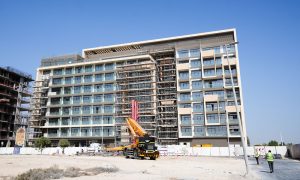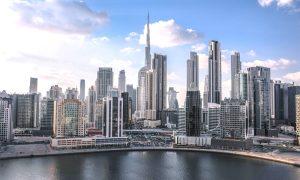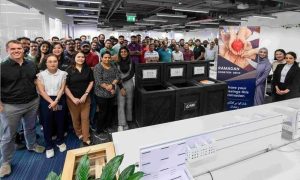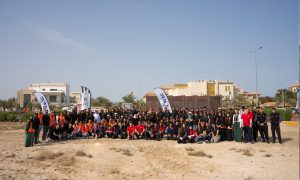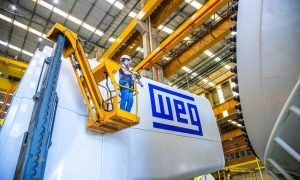The Construction Diplomat
Bechtel’s David Welch sits down with Big Project ME’s Gavin Davids to explain why his international diplomacy experience will benefit his firm as it steps up operations in the Middle East and Africa

When you’ve helped shape the USA’s foreign policy in the Middle East, you might think you’ve done enough to mark your life as one of some consequence. If you then throw in the fact that you’re a former US Ambassador to Egypt, you may be entitled to think you’ve done enough to be remembered by the world.
And when you’re a former Assistant Secretary of State for Near Eastern Affairs who has helped bring together two formerly implacable foes and put them on a path to full diplomatic and commercial engagement, then you might even claim to have helped alter history.
But if you do think all of those things, then you’re not David Welch. The former Assistant Secretary of State for Near Eastern Affairs is a man who doesn’t believe in looking backwards. Despite all his achievements over 30 years as a career diplomat, Welch has embarked upon a career that he hopes will be equally rewarding, if not more so.
Since late 2008, Welch has been the President of Bechtel’s Europe, Africa and Middle East regions and is tasked with managing strategy and business development at Bechtel’s civil business unit in London.
He sat down with Big Project ME to discuss his philosophy for Bechtel’s operations in the Middle East and how he intends to use his decades of regional experience to help Bechtel enhance its legacy in the Middle East and North Africa.
“I joined the American diplomatic service as quite a young man. I was fortunate enough to have a very good career and was involved in a number of serious foreign policy issues for the United States. But I also thought that it would be good to explore the possibility of a second career,” he relates to Big Project ME during an interview at Bechtel’s offices in Dubai Marina.
“I wanted to do it in something that would test me individually and personally. You could say that I wouldn’t be comfortable if I couldn’t stretch myself. I was attracted to Bechtel as a possibility because I’d seen some of their work over the years, when I was working in Saudi Arabia and Egypt, and I thought, ‘here’s a company that is building things, that is helping people.”
“At the end of the day, when the project is finished, everyone has a result and ideally everything is done in an efficient and safe manner. I was involved in exciting things when I was in government, but the truth is that a lot of projects didn’t get completed and things weren’t done so efficiently, and sometimes there were questions as to whether they helped or hurt people. So it was a complete shift in focus in my career, and I liked the ethical values of Bechtel too. It’s an organisation that runs itself to a very high discipline and standards. It doesn’t cut corners when it comes to honesty, that’s very important to me as a person,” he reiterates.
So what can a former career diplomat bring to one of the largest construction companies in the world? After all, as Welch would be the first to admit, he’s not the best person to go to when it comes to talking shop and making construction related decisions.
However, that isn’t what he’s been brought in to do. As he puts it, his job is to utilise his vast knowledge of regional languages and customs (he’s fluent in Spanish and Arabic) to ensure that Bechtel is able to provide the best service possible to its clients in the region.
“I think that having been involved in government at the highest level, there are some experiences that are valuable, but we shouldn’t exaggerate that. Instead, what I think is that our business is a global business. That means global engagement and local performance,” says Welch, outlining his philosophy.
“We work inside of other societies, I cover Europe, North Africa and the Middle East, and they’re all very different cultures and societies, amongst themselves even. So I think that we can become a more successful company, the more we can understand that and become a part of it. That’s a skill and an insight that I’m trying to bring to this job.”
“Now, I have an advantage because Bechtel has been in the Middle East, and in Saudi Arabia, for nearly 70 years – 50 years in the UAE – so it’s not like we don’t have some sort of knowledge base in the region, in fact, it’s quite sophisticated in some cases.”
“The second point I’d say is that when you’re involved in big decisions, what you don’t know is at least as important as what you do know. The biggest risk is when you don’t know you don’t know something. I know a lot about thinking through decisions and managing risk,” he says.
“That’s interesting in the corporate world, because the standard can be, in some instances, more clear. You’re running a business and the focus is on the bottom line, but then in projects, there are schedules, performances, budgets and people. And then there are the intangibles. The intangibles are the society and the environment you’re operating in.”
With Bechtel being a privately held firm, there isn’t a publicly traded balance sheet to draw on, nor can it rely on the US government to bail them out of its mistakes, so therefore, the quality of decision making has to be absolutely spot on, Welch points out.
Given the scope and scale of its projects in the Middle East region, this is probably for the best. Having been appointed, as part of a consortium with Siemens, CCC and Almabani, to the $10 billion project to build Lines 1 and 2 of the metro system, the pressure is on for Bechtel.
“A Saudi friend of mine told me the other day that he’d been to an event where the deputy governor of Riyadh was present, and he told me that all the Saudis in the room said that it was really important that this metro system gets done, because this city needs world class public transportation. But to do it is difficult, so (they need to be) aware that we’re going to be affecting their lives for several years now! (But) It’s great that their leadership is immediately, from the top down, signalling their support and interest in this project, and that they’re looking to educate their public that it’s not going to be an easy thing to do,” he reiterates.
“We like working in Saudi Arabia, our experience there has been very good. We’ve done some good things with them and they’ve respected that over the years. We have people at the very top of Bechtel who have been going in and out of the Kingdom for decades,” Welch says, as he outlines the many challenges of working in a city like Riyadh.
“The biggest challenge on the Riyadh Metro is that it’s a city of five million people with immensely complex traffic, and we’re going to do two lines of metro through the densest part of the city.”
“That’s what we’ve been hired to do. It’s going to be both exciting and challenging. I’m sure they thought very carefully about which companies they wanted to choose, particularly for those two lines, which are the biggest parts of the project. Everybody at Bechtel, from Riley Bechtel down, is riveted on this project and we’re determined to begin it well and give the people of Saudi Arabia the metro system they deserve.”
One area that has worried a number of contractors in the Kingdom has been the lack of construction materials available to them due to the supply/demand imbalance throughout the country. One major cause of the shortage in supply is due to the conflict in Syria, which has hampered the delivery of materials to Saudi Arabia over land.
Coupled with the lack of labour now available to them due to the Nitaqat ruling, there have been serious concerns raised about their ability to complete their projects.
However, Welch says that Bechtel already came to the project knowing that this would likely to be an issue and has prepared accordingly.
“We’ve already worked around that problem in other projects and our logistical pipeline doesn’t really run through Syria either. I know it would be an issue for local contractors because the Turkish truck trade is really important to this area, but I don’t foresee it being a problem for us. I’m not belittling the challenge posed by a $23 billion investment and what it’ll mean to the cement and steel market, but if you look at the consortia, these are fairly big, substantial companies with a lot of experience. They’ll be organising themselves to meet these challenges,” he asserts.
“I feel very good about our consortia,” Welch adds. “We’re lean – with four companies – and all have complementary skills. Almabani has worked with the Municipality of Riyadh for a long time – they’re a competent civil contractor, Siemens is a world class, state of the art, rolling stock provider and CCC is one of the most substantial construction companies, not just regionally, but globally as well.”
While he does concede that the project could have an impact on the pricing of the materials, he remains assured that Bechtel has kept a handle on things, so as to ensure that it doesn’t get too out of hand.
“It’s happened in the past, where if the market heats up, you can have unexpected inflation spikes. Those risks need to be managed.”
“We pay very close attention to the procurement side, it’s really just because we do so much, that we have to be really close to it,” he explains to Big Project ME.
“If you’re buying stuff for an airport, then you visit the factories in China or in India. You see what the manufacturers actually do, because they’re producing something that might be machined, that’s purpose built, replacing it would be very hard and you have to absolutely sure about the quality,” Welch asserts.
Although Saudi Arabia and the rest of the GCC remain the major focus for Bechtel and David Welch, he tells Big Project ME that his ambitions for the construction giant extend much further than that. Having had projects in Libya and Egypt prior to the Arab Springs in those countries, he says that Bechtel is now looking at assessing the risks involved with returning to them and finishing the job.
“To be honest, we’re risk averse when it comes to security. We’ve had a lot of difficulty in some places and we’re very conscious about the security of our employees and those who work on our projects,” Welch says.
“We have an electricity project in Sirte, Libya – we’re the construction managers for it, but we have to manage that from afar because of security concerns. We’re not happy with that, to be honest with you. My colleagues, the construction and engineering guys, they’re hands on people and they like to be right there on site. There’s a lot of dissatisfaction when we have to manage from afar. It’s possible to do, but it’s not the way we’d like to do it.”
“In Tunisia, we didn’t have any ongoing work, but we were looking at a couple of opportunities, but we decided not to. So yes, that’s been put on the back burner. In Egypt, we still have ongoing work, and the recent disturbances were a bit of a shock and the American and British governments were advising some citizens not to travel there, as well as some Gulf governments too, so we have a lot of employees who are very cautious of those travel warnings, but we think that we can operate in Egypt effectively,” he says.
“In Algeria, we’ve had a number of projects there in the past, but we haven’t got any current businesses and we’re not pursuing it right now. Morocco would be fine, but our track record there is not very deep, but we’ll definitely be taking a closer look at Morocco.
“We’ve also opened a country office in Mozambique and we’ve just finished a LNG plant in Angola. We’re involved with a country master-plan and institutional project management for the government of Gabon, which is a very interesting project. We’re also involved in a feed contract with Anadarko in Mozambique. So we’ve opened the country office there.”
“Sub-Saharan Africa is a growing area of interest for us, we’re devoting a lot more resources there and it’ll be a lot easier to service that market from here in Dubai,” he says, as he brings the interview to a close. n

